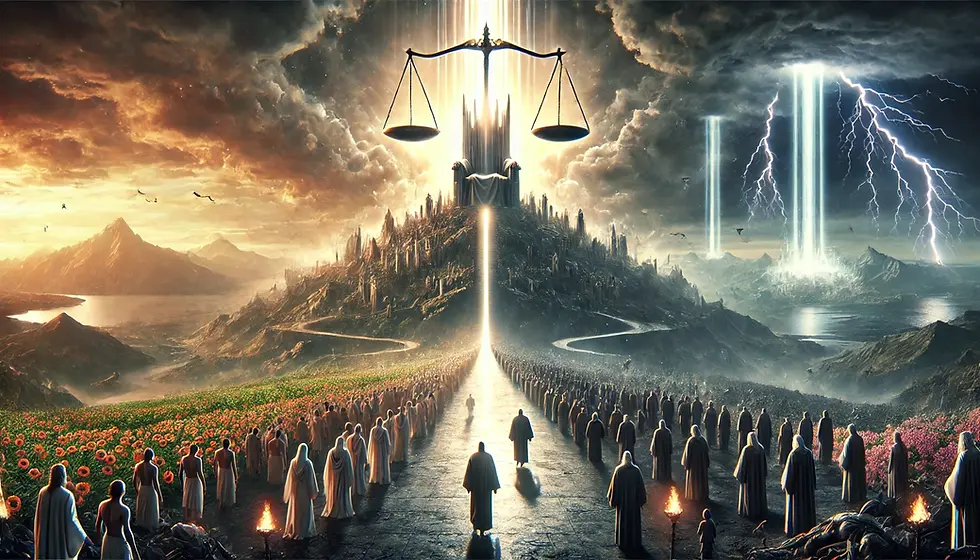Monotheism Affirmed: The Shema and the Foundation of Paul's Theology
- Edward D. Andrews

- Jun 30, 2025
- 3 min read

Deuteronomy 6:4; 1 Corinthians 8:4–6; Paul's unwavering confession of one God (εἷς θεός)
At the heart of Paul’s theology lies a strict and unwavering commitment to monotheism, a doctrine inherited from Israel’s Scriptures and crystallized in the Shema: “Hear, O Israel: Jehovah our God, Jehovah is one” (Deuteronomy 6:4). This foundational confession—JHVH is one—formed the bedrock of Jewish identity and faith. For Paul, a trained Pharisee and devout Jew (Philippians 3:5), this was not merely an abstract doctrinal statement, but the very lens through which all theology, ethics, and salvation were interpreted. His Christian confession did not abrogate this core truth; rather, it clarified and completed it through the revelation of Jesus the Messiah.
In 1 Corinthians 8:4–6, Paul reaffirms this monotheistic framework in the face of pagan polytheism. Addressing a Corinthian church immersed in Greco-Roman religious pluralism, he writes:
“We know that an idol is nothing in the world, and that there is no God but one (οὐδεὶς θεὸς ἕτερος εἰ μὴ εἷς). For even if there are so-called gods, whether in heaven or on earth—as indeed there are many ‘gods’ and many ‘lords’—yet for us there is one God (εἷς θεός), the Father, from whom are all things, and we for him; and one Lord (εἷς κύριος), Jesus Christ, through whom are all things, and we through him.”
Here, Paul does not dismantle monotheism; he reinforces it. The phrase “εἷς θεός” (one God) directly echoes the Shema and maintains that only one true God exists. The inclusion of Jesus as “one Lord” does not create a second deity or compromise Jewish monotheism. Rather, Paul distinguishes relational roles within the divine economy while maintaining ontological unity. The Father is the ultimate source (ἐξ οὗ) of all things; Jesus the Messiah is the divine agent “through whom” (δι’ οὗ) all things came into being. This is not subordination in essence but distinction in function.
This formulation echoes Isaiah 44:6—“Thus says Jehovah, the King of Israel and his Redeemer, Jehovah of hosts: ‘I am the first and I am the last; besides me there is no god’.” Paul preserves this exclusivity. There are not “gods many” and “lords many” in reality, but only one true God and one exalted Lord through whom redemptive history is fulfilled.
Moreover, Paul’s strict monotheism is polemical. In Romans 3:29–30, he argues that since God is one (εἷς ὁ θεός), he must be the God of both Jews and Gentiles. This theological axiom undergirds Paul’s entire doctrine of justification by faith—if there is one God, there can only be one plan of salvation for all peoples.
Paul’s unwavering confession of one God stands in contrast to paganism, mysticism, and even later Christian distortions that blur or divide the Godhead. Paul does not articulate a developed Trinitarian theology in the creedal sense, but he preserves functional unity and relational distinction in the Godhead without compromising the Shema’s monotheism.
This foundational principle is the theological anchor of Paul’s gospel:
God is one, not many.
God is personal, not abstract.
God is consistent, not dualistic.
And God is revealed in Christ, not hidden in mystery cults or speculative systems.
In Paul, the Shema is neither redefined nor diluted—it is reaffirmed and fulfilled through the exaltation of Jesus the Messiah, who reigns as Lord within the identity of the one God. Thus, Paul’s monotheism remains intact, unaltered, and inseparable from his Christology.
About the Author
EDWARD D. ANDREWS (AS in Criminal Justice, BS in Religion, MA in Biblical Studies, and MDiv in Theology) is CEO and President of Christian Publishing House. He has authored over 220 books. In addition, Andrews is the Chief Translator of the Updated American Standard Version (UASV).




Comments